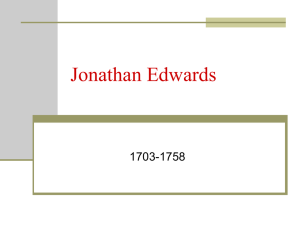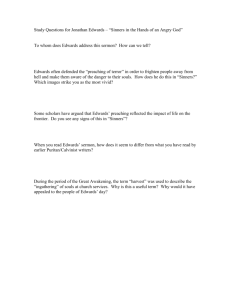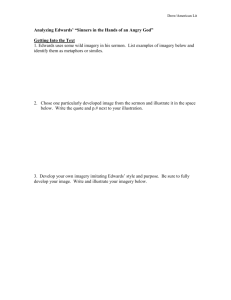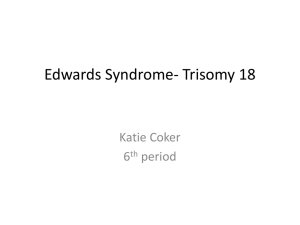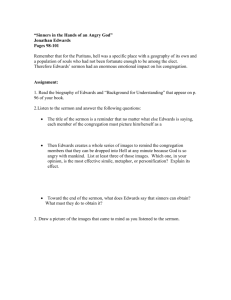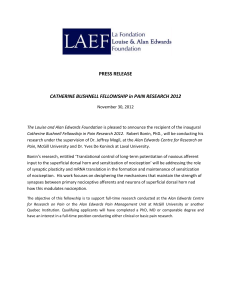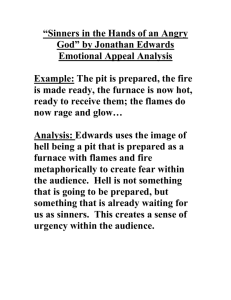R -v- Edwards and Edwards - Courts and Tribunals Judiciary
advertisement
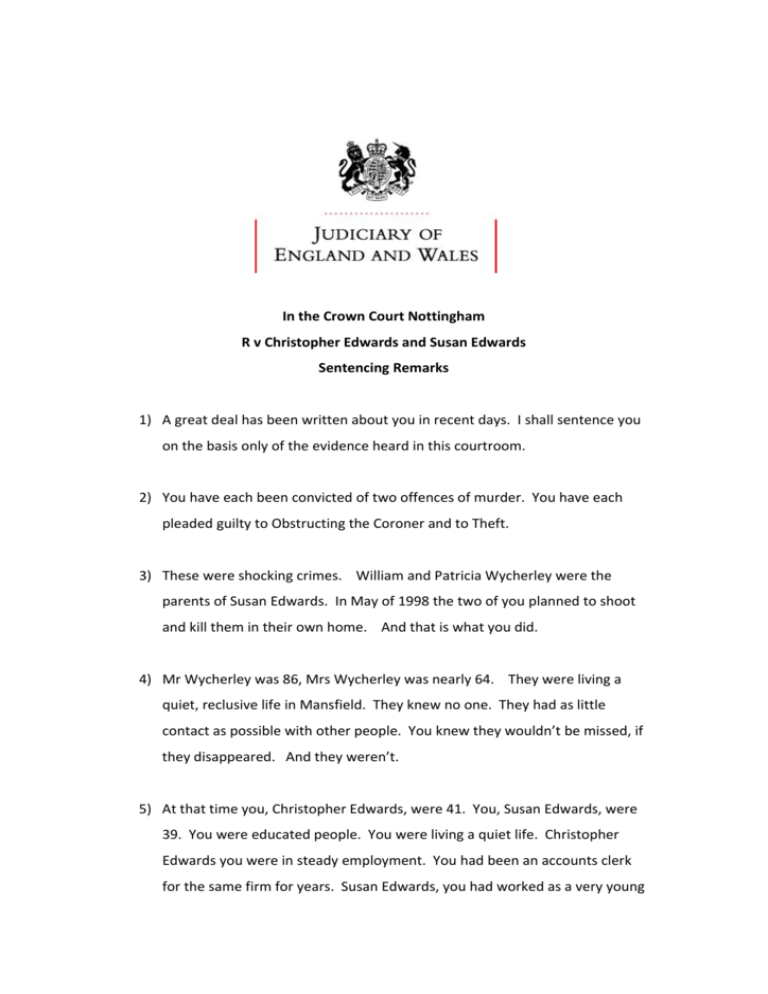
In the Crown Court Nottingham R v Christopher Edwards and Susan Edwards Sentencing Remarks 1) A great deal has been written about you in recent days. I shall sentence you on the basis only of the evidence heard in this courtroom. 2) You have each been convicted of two offences of murder. You have each pleaded guilty to Obstructing the Coroner and to Theft. 3) These were shocking crimes. William and Patricia Wycherley were the parents of Susan Edwards. In May of 1998 the two of you planned to shoot and kill them in their own home. And that is what you did. 4) Mr Wycherley was 86, Mrs Wycherley was nearly 64. They were living a quiet, reclusive life in Mansfield. They knew no one. They had as little contact as possible with other people. You knew they wouldn’t be missed, if they disappeared. And they weren’t. 5) At that time you, Christopher Edwards, were 41. You, Susan Edwards, were 39. You were educated people. You were living a quiet life. Christopher Edwards you were in steady employment. You had been an accounts clerk for the same firm for years. Susan Edwards, you had worked as a very young woman but gave up your post in the 1980s and did not work after that. You had no friends and did not enjoy meeting new people. Christopher Edwards, you had work colleagues but gave up socializing because your wife did not like it. 6) You were a completely self contained couple. So far as you were concerned only the two of you mattered. 7) Christopher Edwards, you were interested in military history. You also had an interest in and expertise in firearms, as you described during the course of the trial. Susan Edwards, you had an interest in historical military heroic figures. By the late 1990s you were building up debts by, you say, purchasing memorabilia and stamps relating to your military heroes, things you could not afford. 8) Susan Edwards, 30 years ago you told your husband that you had been sexually abused by your father when you were a little girl. You told the police the same thing, and repeated it to the jury in your trial. Because you are an accomplished liar and a fantasist I have hesitated before accepting this. However there is evidence, wholly independent of the two of you, that when you were married, William Wycherley was irrationally jealous. On reflection and balance therefore I accept that your father had sexually assaulted you when you were young. The abuse stopped when you were 11. You left home in your early 20s. That background may well explain why you hated him, which you did, and why you have no remorse about killing him. Given that you left home in the early 1980s, some 15 years before the murders I cannot accept that his conduct, wholly wrong as it was, explains your decision to kill him in 1998. Having heard your account to the jury I do not accept that your mother was ever aware of what your father had done. 9) There was something that you held against both your parents for many years. When you were 21 you were left £10,000 by the second wife of your adored grandfather. Half of it you spent on holidays for yourself and your mother. In 1979 the other half was used in the purchase of your parents’ home in Edgware. Your name was on the deeds. You say that your parents emotionally blackmailed you into signing over your interest in the house to them because it had been your grandfather’s wish that your mother should inherit. That was in 1983 and it is plain from your interviews and from your evidence in the trial that you considered then and still consider that your parents had deprived you of what you thought was rightfully yours. They sold that house at a profit, and bought a cheaper house in Mansfield. They kept all of the proceeds. You never forgave them. Your resentment festered for years and at the same time you were getting yourself into debt, as I have described. 10) I sentence you on the basis that each of you intended that both Mr and Mrs Wycherley should be shot dead. I do not know whether you acquired the murder weapon in advance and brought it to their home or whether you planned to use a gun owned by Mr Wycherley; it doesn’t matter. Either way the plan was to shoot them, to kill them and you made sure you had a gun to do so. I am sure that it was you, Christopher Edwards, who held the gun. At point blank range you fired two bullets into each of them with deadly accuracy. 15 years later when her body was examined one of those bullets was still lodged in the spine of Mrs Wycherley. It must have gone through her aorta. She would have died within seconds. The evidence was that Mr Wycherley too would have died quickly, though not as quickly as his wife. I am sure, Susan Edwards, that these killings were initially your idea and that your husband agreed to carry them out. I have no doubt that you were acting together, you Susan Edwards encouraging Christopher Edwards at the scene and assisting him later in concealing the bodies to which I shall turn in a moment. You are each as responsible as the other for these crimes and I see no reason to distinguish between you on sentence. 11) Having carried out these ruthless killings you got rid of the bodies. I use that phrase deliberately. This was in no sense a burial. There was no dignity, no respect. The point of this was to cover up the killings and move onto the next stage of your plan. 12) You wrapped the bodies in duvet covers, you dragged them down the stairs. Everyone who heard your matter of fact accounts of how you did that will remember them for years. Those graphic accounts were delivered with remarkable detachment. I will not repeat them. Christopher Edwards dug the hole in the back garden. As the photographs show, you folded the bodies and bundled them into the hole so that they were found with their knees bent, in the foetal position, one on top of another. You filled the hole and then planted shrubs on top. Those facts are the basis of the count of obstructing the coroner, to which you pleaded guilty shortly before your trial. 13) You told the neighbours that Mr and Mrs Wycherley had gone on holiday, and then, in due course that they had decided to sell the house. Susan Edwards concocted and sent lively and imaginative notes and Christmas cards to relatives to give the impression that your parents were travelling around Ireland where the air was good. The relatives were completely taken in by your lies. No one asked a single question. You wrote letters to the doctor’s surgery when reminders came for vaccinations and the like, refusing them on plausible grounds. 14) But before you began writing letters to maintain the fiction that your parents were still alive you had first got on with what you were really interested in – getting their money. These facts formed the basis of the count of theft to which you also pleaded guilty before trial. 15) As soon as the banks opened, on the Tuesday after the bank holiday, you were in the building society doing two things just as you had intended to do: opening a new account in the joint names of yourself and your dead mother, closing two accounts in the joint names of your parents, and taking every penny out of them, about £40,000. You say £15,000 went to pay off a credit card. What happened to the rest is unclear. You suggested it went on memorabilia. Who knows? Either way, it went to you and Christopher Edwards and you spent it. True it is that after claiming Mr Wycherley’s pension for some time you tried in October 1998 to cancel it, but once you learned that it could be paid into a bank account you made arrangements for that to be done. For 15 years, the two of you took and spent over £175,000 which was payable to Patricia and William Wycherley in private pensions, state pensions, industrial injuries benefits, winter fuel payments and even Christmas bonus payments. Christopher Edwards was still working and Susan Edwards was still at home. Thousands of pounds were spent on celebrity photographs, letters and so on. Notwithstanding the pensions and the savings you got into more debt. You obtained loans and credit cards in Mrs Wycherley’s name, and still the spending continued and you decided the house would be sold in 2005. You forged the necessary documents and kept the proceeds of sale, just under £67,000. Christopher Edwards you said you were against the house being sold because it would mean losing control of what you described as the burial site. And so it would. But your concern was only for the two of you, that this loss of control might lead to discovery. No thought was given to the people who would buy the house or to the family who would live there for years, learning only in 2013 of what had gone on in their home and what lay in their garden. In 2012 you fled to France when the DWP contacted Mr Wycherley, seeking a meeting before his 100th birthday. You returned to the jurisdiction voluntarily, in 2013, with no money. 16) Because you committed these offences so long ago I must apply the sentencing regime that was in force at the time. I must not specify a minimum term greater than that which the Secretary of State would have notified at that time. The provisions of Schedule 21 of the CJA 2003 which identify a number of starting points were not then in force. The single starting point for the minimum term for murder in 1998 was identified by the then Lord Chief Justice as 14 years and that is the starting point that I take. 17) Mr Enoch and Mr Howker have reminded me that I should have regard to the Practice Statements that followed in 2000 and 2002, most recently in Practice Statement (Crime Life Sentences) [2002] which contained three starting points: a normal starting point of 12, a higher starting point of 15/16 and a further starting point of 20 years for offences described as especially grave, including terrorism cases. This is not such a case, they submit. This is not a case which in 2002 would have merited a starting point of 20 years. In respect of the 15/16 year starting point I note paragraph 49.19 of the direction (referred to in paragraph 32 of the decision of the Court of Appeal in R v Sullivan [2005] 1 Cr App R (s) 67, “A substantial upward adjustment may be appropriate in the most serious cases….in suitable cases the result might even be a minimum term of 30 years”. This chimes with the observations of Lord Bingham in 1997 that a punitive term of longer than 30 years would (at that time) be very rare indeed. 18) Lord Bingham identified 8 mitigating factors, none of which is present here. Of the list of 11 factors requiring a sentence more severe than the norm, no fewer than 6 are present here: this was a planned shooting for gain of two victims, one of whom was in his 80s. Once they were dead their bodies were dumped in a hole in the back garden to avoid discovery. And then the elaborate charade began, pretending they were alive, for 15 years. This is not a question of ticking boxes. It is a question of accurately assessing the seriousness of these offences and your culpability for them. I have considered with care all that has been urged on your behalf, Christopher Edwards, by Mr Enoch and on your behalf, Susan Edwards, by Mr Howker but the facts of this case are so serious and your culpability so high as to require me to move a very great deal higher than the 14 year starting point to which I have already referred. 19) You are in your late 50s. You are going to spend most, if not all, of the rest of your lives in prison. I accept that prison has been very difficult for both of you. Susan Edwards, I accept that you are particularly isolated and will remain so throughout your sentence. Christopher Edwards, Susan Edwards. 20) The sentence I impose upon each of you is the same. On each count of murder, life imprisonment with a minimum term to be served before you are considered for parole of 25 years. For the offence of obstructing a coroner, 5 years’ imprisonment. For the offence of theft, 4 years’ imprisonment. All those sentences will run concurrently. The minimum term you will serve before you are considered for parole therefore is 25 years.
